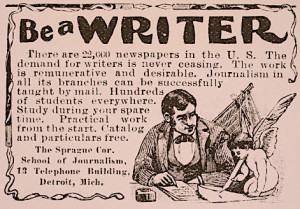 In the fascinating Thousand Ways to Earn a Living (1888) the section on ‘Literary Work’ covers journalism, authorship, and something called ‘compilation’. In the journalism chapter modern-day readers might be surprised at the high rates of pay awarded to humble London hacks ( up to £10 a week in 1888—more than a skilled surgeon or a junior barrister might earn ), but few could argue that in late Victorian Britain , as in 2017, in the newspaper world ‘ the majority of new ventures are promoted by newspaper men who have been underpaid or unfairly dealt with by their employers ‘.
In the fascinating Thousand Ways to Earn a Living (1888) the section on ‘Literary Work’ covers journalism, authorship, and something called ‘compilation’. In the journalism chapter modern-day readers might be surprised at the high rates of pay awarded to humble London hacks ( up to £10 a week in 1888—more than a skilled surgeon or a junior barrister might earn ), but few could argue that in late Victorian Britain , as in 2017, in the newspaper world ‘ the majority of new ventures are promoted by newspaper men who have been underpaid or unfairly dealt with by their employers ‘.
Nor, it seems, has the world of vanity publishing changed much. After praising the commitment to potential authors of such a serious publisher as Bentley (who brought out the early work of Dickens), the dangers of unscrupulous publishers is addressed:
‘Advertising sharks should be avoided. Their only aim is to obtain money from unsuspecting writers of inexperience, and they generally manage to rob those whom they get into toils considerably. During the past few years they have been exposed in many papers; but, as their advertisements still appear, there is no doubt that they are still engaged in their nefarious work. Their advertisements may easily be detected. They generally address their announcements to ‘Authors, Amateurs, and others’; sometimes it is fiction, at others poetry that is wanted. But in every case it is plunder that is meant. Mr Walter Besant has laid down the axiom that no one should pay for the publication of his literary work. In the majority of cases this is a good rule, though like many another good rule, it has its exceptions…’
The rewards earned by novelists has perhaps changed a little in 130 years. Back then ‘the novel-writer ‘, we are told, got’ £50 to £1,000 for a book’. To us this seems rather generous, considering that in 2017 an average first-time novelist would be lucky to receive an advance of £500. What has changed greatly since 1888 is the demise of the serial.’ The modern novelist’, it was reported, ‘ usually manages to run each story he writes through a magazine and a number of provincial and colonial newspapers before issuing it in book form ‘. Incidentally, note the gendering of this modern novelist at a time when the most popular novelists were likely to be writers like Rhoda Broughton and Marie Corelli.
Finally, we are informed that ‘compilation is a more important branch of the literary profession than is usually supposed. ‘
‘At the British Museum, in London, there are a number of ladies and gentlemen employed by publishers in the preparation of biographers and other works. Many well known writers employ assistants of this description. No rule can be laid down as to rates of pay’.
Nowadays, of course, this hapless ‘compiler’ is more likely to be labelled an intern and consequently receive nothing, either from publisher or ’writer’.
Perhaps, after all, there is something to be said for ‘Victorian values’.
